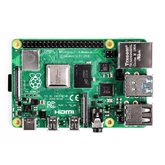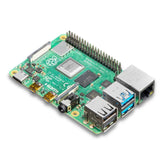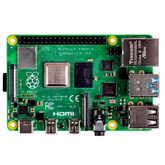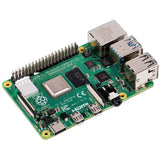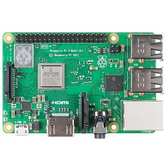Raspberry Pi in IoT – How It Works & Top Applications
Summary
Discover the endless possibilities of IoT with Raspberry Pi! Our blog, "Introduction to IoT Using the Raspberry Pi," delves into the world of Internet of Things. Learn what Raspberry Pi is, the types of IoT devices it can create, and how it's revolutionizing the IoT landscape. Explore its applications, from home automation to industrial solutions, and understand why it's the preferred choice for IoT enthusiasts. Uncover the advantages of integrating IoT with Raspberry Pi, and we'll guide you through the implementation process.
Introduction to IoT Using the Raspberry Pi
The Raspberry Pi is a powerful, low-cost device with the power to revolutionize the way we interact and engage with technology. As an introduction to IoT (Internet of Things), it provides users access to millions of connected devices that allow us to automate many everyday tasks while also gaining insight into our lifestyle choices through data analysis.
With its small form factor, user-friendly environment and affordability, this tiny computer has been quickly adopted by developers, businesses and hobbyists alike as one of their favorite platforms for exploring what's possible in internet connectivity today. From controlling smart home appliances or security systems remotely from anywhere in the world using your phone or laptop, tracking medical equipment readings via wearable sensors, mining cryptocurrency as part of distributed networks - these are just some examples of how you can leverage Raspberry Pi when introducing yourself into the IoT landscape filled with possibilities.
It’s easy enough for a novice programmer yet flexible enough for more experienced professionals – whether you're looking towards learning new technologies or wanting create something truly unique & innovative ahead on your competition regardless size industry sector – there’s so much potential here!

Check our collection of Raspberry Pi boards and accessories online
What Type of IoT Device is the Raspberry Pi?
The Raspberry Pi is a type of IoT device that offers an immense range of digital media, communications, and computer applications. It was initially developed as a low-cost alternative to mainstream consumer electronics like smartphones and tablets but has since evolved into a powerful tool for robotics development too.
With the addition of efficient sensors, motors, batteries, cameras etc., it can be used in all kinds of projects from home security systems to weather monitoring stations – making it one versatile piece hardware! The best thing about this gadget is its affordability; you don’t need expensive components or lots expertise to get started with your own devices using the RPi platform.
Furthermore if you are looking for power combined with programming capability then this should definitely make great choice as its cutting edge technology allows custom programs written on any language from HTML5/CSS3 through Python & Ruby to C++ giving users opportunity create their very own solutions quickly effectively just few clicks away thanks special interface called Raspbian OS which helps import export data safely securely straight onto tablet laptop without wires fuss hassle!
What is Raspberry Pi in IoT?
The Raspberry Pi is an incredibly powerful, versatile and affordable tiny computer board that has helped to revolutionize the Internet of Things (IoT). With its robust processing capabilities, reliable connectivity options and low power consumption, it’s no wonder why so many IoT projects rely on this device. Its small form factor allows for easy integration with other devices in IOT networks while also providing tremendous computing potential without overheating or using precious resources like energy.
Plus, because it runs Linux-based operating systems instead of Windows ones, such as Microsoft 10 series or any others, you can easily leverage scripting languages like Python to develop your applications quickly and securely. This makes the Raspberry PI extremely suitable for powering data streamers collecting information from edge sensors across vast distances which would otherwise be impossible due to cost constraints associated with traditional hardware solutions. It's remarkable how much functionality one little gadget can provide - making remote monitoring a reality wherever needed!
What is IoT? Everything you need to know
How is Raspberry Pi Used in IoT?
The Raspberry Pi is a powerful tool for Internet of Things (IoT) applications. By connecting the small computing board to hardware components, it can collect and analyze data from various sensors in real-time.

With its ability to be programmed with languages such as Python, C++ or Java, developers are able to develop custom algorithms that help make IoT systems smarter than ever before. This opens up new opportunities for businesses who want increased control over their connected devices - allowing them to monitor performance more effectively while also creating automated programs for tasks like scheduling maintenance checks or checking stock levels at retail stores automatically without human intervention required.
Additionally, using Raspberry Pis helps reduce costs by bringing down hardware requirements compared traditional methods; this makes it an ideal solution when budget is a concern whilst still requiring advanced analytics capabilities. Ultimately, through leveraging the power of Raspberry Pi in iot solutions companies can open themselves up to better insights on consumer behaviour leading ultimately towards enhanced customer experiences!
What is Raspberry Pi used for in IoT?
The Raspberry Pi is an essential tool for the Internet of Things (IoT). It's small, powerful size enables users to build their own smart devices and connect them with other IoT gadgets. With a few basic components, it’s simple to create connected home appliances or even complex industrial systems.
Its low cost makes it accessible to hobbyists who want to dive into tinkering without breaking the bank. Most importantly, though, its open-source nature allows developers versatile access when creating applications that integrate IOT functionality across multiple platforms and hardware layers within seconds—and at minimal cost due to little energy consumption during programming operations.
As so many industries are implementing some form of IoT solution in order not only to optimize processes but also to protect citizens from security threats by monitoring networks 24/7, being equipped with such a dependable device may prove invaluable going forward, making Raspberry Pi an increasingly indispensable asset for ubiquitous connectivity solutions!
Explore the role of Raspberry Pi IoT in Transforming Education
Why is Raspberry Pi used for IoT devices?
The Raspberry Pi is the perfect platform for powering Internet of Things (IoT) devices. It's inexpensive, small in size, and extremely versatile. With built-in Bluetooth and Wi-Fi connectivity options, it can be easily integrated into almost any project or device without significant overhead infrastructure requirements.

By leveraging its Linux operating system compatibility as well as existing support from developers all over the world for coding libraries used by IoT machines to interpret sensor data streams effectively; businesses have a tried and tested low-cost solution ideal for developing powerful connected products efficiently on tight budgets with limited time frames.
The same strategy works great when building large networks of interlinked smart devices across entire industrial landscapes where dozens, if not hundreds, are simultaneously recorded while processing complex logic activities securely, all based around one single board computer!
How to SSH into an IoT device – A step-by-step guide
Learn Why GSM Modules Are Essential for IoT Projects
What are the Benefits of IoT in Raspberry Pi?

Increased efficiency:
IoT in Raspberry Pi can allow businesses to automate processes, giving them greater opportunities for optimization and increased performance.
Cost savings:
Automated processes mean that machines not only work faster but also require less human intervention, leading to more cost-effective operations overall.
Enhanced security and privacy protection:
By incorporating the latest technologies such as blockchain, AI & ML into your system with Raspberry Pi’s secure architecture, it provides an additional layer of defense against potential threats or malicious actors trying to gain access through online connections or other digital channels..
Real-time sensor tracking:
Through the implementation of sensors within a connected network, you have direct visibility over all activities taking place onsite, allowing immediate action if needed to be applied.
Data visualization insights :
With real-time monitoring provided by Raspberry Pi's IoT systems, data visualizations are made possible, enabling managers to quickly identify patterns which may indicate areas needing attention when making decisions based on countless pieces of important information collected from their environment .
Improved asset utilization:
Implementing Internet Of Things (IoT) technology allows locations like large industrial sites to take advantage of advanced analytics tools used while capturing useful information regarding usage levels per device, helping facilitate better deployment tactics across multiple environments
Implementation of IoT with Raspberry Pi
The implementation of IOT with Raspberry Pi has revolutionized the way businesses operate. This powerful platform is designed for scalability, offering a range of features that enable organizations to deploy enterprise-level solutions quickly and efficiently.
By combining low cost hardware components like the Raspberry Pi along with powerful software tools such as Node-RED or MQTT, professionals can easily create complex systems remotely over private networks or cloud infrastructures. With its secure environment support and full integration into modern technologies such as AI and facial recognition algorithms, it provides robust management capabilities to its users while facilitating efficient collaborations between multiple stakeholders in any organization.
It's no wonder then why more companies are adopting IoT powered by this same technology, allowing them access to real-time data processing across distributed devices thereby resulting in improved customer satisfaction levels backed by reliable service delivery models under budget constraints!
Conclusion
We've embarked on an exciting journey into the world of IoT using the Raspberry Pi. We've explored the various aspects of this remarkable device, from understanding its role as an IoT powerhouse to its versatility in creating smart, connected solutions. With the Raspberry Pi, you can innovate, create, and make your IoT dreams a reality. Its cost-effectiveness, wide-ranging applications, and community support make it an ideal choice for both beginners and experts.
Please do check out other blog posts about Popular electronics
Make sure you check out our wide range of products and collections (we offer some exciting deals!)
Excerpt
Frequently Asked Questions
1. How do i make my raspberry pi a iot device?
To make your Raspberry Pi an IoT device, you need to connect it to the internet and interface it with sensors or actuators. Start by installing an operating system like Raspberry Pi OS. Then, use programming languages like Python to read data from sensors connected to the GPIO pins. Finally, send this data to a cloud platform or a local server using protocols like MQTT or HTTP for monitoring and control.
2. How to monitor and control raspberry pi and iot device management?
Raspberry Pi and IoT Device management is becoming increasingly important as technology advances. To properly monitor and control these devices, a professional approach must be taken to ensure the security of your data. Firstly, it is essential to invest in up-to-date software solutions that protect against hacking attempts or any malicious activity targeting sensitive information stored on connected devices. It should also include protection from viruses, malware and other cyber threats that could compromise business operations or lead to costly disruptions for organizations. Secondly, regularly monitoring associated systems will help reveal unauthorized activities right away which can prevent damage before it sparks into full fire causing serious disruption of normal system functioning. Lastly having an experienced IT team who knows how Raspberry pi functions well enough would benefit businesses significantly when setting up effective strategies for success long term!
3. How is Raspberry Pi used in IoT projects?
Raspberry Pi serves as a compact computing platform for IoT projects. It processes data from various sensors, connects to the internet for data exchange, and controls other smart devices. Its GPIO pins enable direct sensor connections, making it versatile for home automation, environmental monitoring, and smart agriculture applications.
4. What makes Raspberry Pi ideal for IoT applications?
The Raspberry Pi's low cost, compact size, and extensive community support make it ideal for IoT applications. It offers sufficient processing power, GPIO connectivity for sensors, and built-in Wi-Fi options. Its compatibility with multiple programming languages further enhances its versatility in developing innovative IoT solutions.
5. What are some examples of IoT projects using Raspberry Pi?
Examples of IoT projects with Raspberry Pi include smart home automation systems, weather stations, and real-time data monitoring dashboards. Additionally, it's used in security cameras, smart irrigation systems, and even DIY smart mirrors, showcasing its flexibility for various applications.
6. How do I connect sensors to Raspberry Pi for IoT?
To connect sensors to Raspberry Pi, use the GPIO pins for direct wiring. Depending on the sensor type, you may need to configure the software with libraries like GPIO Zero or PiGPIO. Install required packages and write a script to read data from the sensors, enabling real-time monitoring.
7. Can Raspberry Pi connect to the internet without Wi-Fi?
Yes, Raspberry Pi can connect to the internet without Wi-Fi. You can use an Ethernet cable for a wired connection or connect a USB cellular modem. This makes it suitable for remote locations where Wi-Fi isn’t available, ensuring consistent data communication.
8. Which programming languages are used for Raspberry Pi IoT?
Common programming languages for Raspberry Pi IoT projects include Python, Java, and C++. Python is particularly popular due to its simplicity and extensive libraries for handling GPIO and working with sensors. Other languages can also be used, depending on project requirements.
9. How is Raspberry Pi different from Arduino in IoT?
Raspberry Pi and Arduino serve different purposes in IoT. Raspberry Pi is a full-fledged mini-computer, ideal for complex processing and internet connectivity. In contrast, Arduino is a microcontroller focused on real-time tasks and direct hardware interaction, making it suitable for simpler applications.
10. What are limitations of using Raspberry Pi for IoT?
Limitations of Raspberry Pi in IoT include higher power consumption compared to microcontrollers, which may not be ideal for battery-operated projects. Its complexity can also pose a challenge for beginners. Additionally, the reliance on an operating system may lead to longer boot times.
11. How to control IoT devices remotely using Raspberry Pi?
To control IoT devices remotely with Raspberry Pi, set up a web server or cloud service. Use platforms like MQTT for messaging, enabling real-time communication. Implement a web or mobile application for user interaction, allowing seamless device management from anywhere.
12. Is Raspberry Pi Pico suitable for IoT applications?
Yes, Raspberry Pi Pico is suitable for IoT applications. Its low power consumption, cost-effectiveness, and simplified interface make it ideal for smaller projects. However, it lacks built-in Wi-Fi, so you'll need additional connectivity options, like external modules, for internet access.
1. How do i make my raspberry pi a iot device?
To make your Raspberry Pi an IoT device, you need to connect it to the internet and interface it with sensors or actuators. Start by installing an operating system like Raspberry Pi OS. Then, use programming languages like Python to read data from sensors connected to the GPIO pins. Finally, send this data to a cloud platform or a local server using protocols like MQTT or HTTP for monitoring and control.
2. How to monitor and control raspberry pi and iot device management?
Raspberry Pi and IoT Device management is becoming increasingly important as technology advances. To properly monitor and control these devices, a professional approach must be taken to ensure the security of your data. Firstly, it is essential to invest in up-to-date software solutions that protect against hacking attempts or any malicious activity targeting sensitive information stored on connected devices. It should also include protection from viruses, malware and other cyber threats that could compromise business operations or lead to costly disruptions for organizations. Secondly, regularly monitoring associated systems will help reveal unauthorized activities right away which can prevent damage before it sparks into full fire causing serious disruption of normal system functioning. Lastly having an experienced IT team who knows how Raspberry pi functions well enough would benefit businesses significantly when setting up effective strategies for success long term!
3. How is Raspberry Pi used in IoT projects?
Raspberry Pi serves as a compact computing platform for IoT projects. It processes data from various sensors, connects to the internet for data exchange, and controls other smart devices. Its GPIO pins enable direct sensor connections, making it versatile for home automation, environmental monitoring, and smart agriculture applications.
4. What makes Raspberry Pi ideal for IoT applications?
The Raspberry Pi's low cost, compact size, and extensive community support make it ideal for IoT applications. It offers sufficient processing power, GPIO connectivity for sensors, and built-in Wi-Fi options. Its compatibility with multiple programming languages further enhances its versatility in developing innovative IoT solutions.
5. What are some examples of IoT projects using Raspberry Pi?
Examples of IoT projects with Raspberry Pi include smart home automation systems, weather stations, and real-time data monitoring dashboards. Additionally, it's used in security cameras, smart irrigation systems, and even DIY smart mirrors, showcasing its flexibility for various applications.
6. How do I connect sensors to Raspberry Pi for IoT?
To connect sensors to Raspberry Pi, use the GPIO pins for direct wiring. Depending on the sensor type, you may need to configure the software with libraries like GPIO Zero or PiGPIO. Install required packages and write a script to read data from the sensors, enabling real-time monitoring.
7. Can Raspberry Pi connect to the internet without Wi-Fi?
Yes, Raspberry Pi can connect to the internet without Wi-Fi. You can use an Ethernet cable for a wired connection or connect a USB cellular modem. This makes it suitable for remote locations where Wi-Fi isn’t available, ensuring consistent data communication.
8. Which programming languages are used for Raspberry Pi IoT?
Common programming languages for Raspberry Pi IoT projects include Python, Java, and C++. Python is particularly popular due to its simplicity and extensive libraries for handling GPIO and working with sensors. Other languages can also be used, depending on project requirements.
9. How is Raspberry Pi different from Arduino in IoT?
Raspberry Pi and Arduino serve different purposes in IoT. Raspberry Pi is a full-fledged mini-computer, ideal for complex processing and internet connectivity. In contrast, Arduino is a microcontroller focused on real-time tasks and direct hardware interaction, making it suitable for simpler applications.
10. What are limitations of using Raspberry Pi for IoT?
Limitations of Raspberry Pi in IoT include higher power consumption compared to microcontrollers, which may not be ideal for battery-operated projects. Its complexity can also pose a challenge for beginners. Additionally, the reliance on an operating system may lead to longer boot times.
11. How to control IoT devices remotely using Raspberry Pi?
To control IoT devices remotely with Raspberry Pi, set up a web server or cloud service. Use platforms like MQTT for messaging, enabling real-time communication. Implement a web or mobile application for user interaction, allowing seamless device management from anywhere.
12. Is Raspberry Pi Pico suitable for IoT applications?
Yes, Raspberry Pi Pico is suitable for IoT applications. Its low power consumption, cost-effectiveness, and simplified interface make it ideal for smaller projects. However, it lacks built-in Wi-Fi, so you'll need additional connectivity options, like external modules, for internet access.



